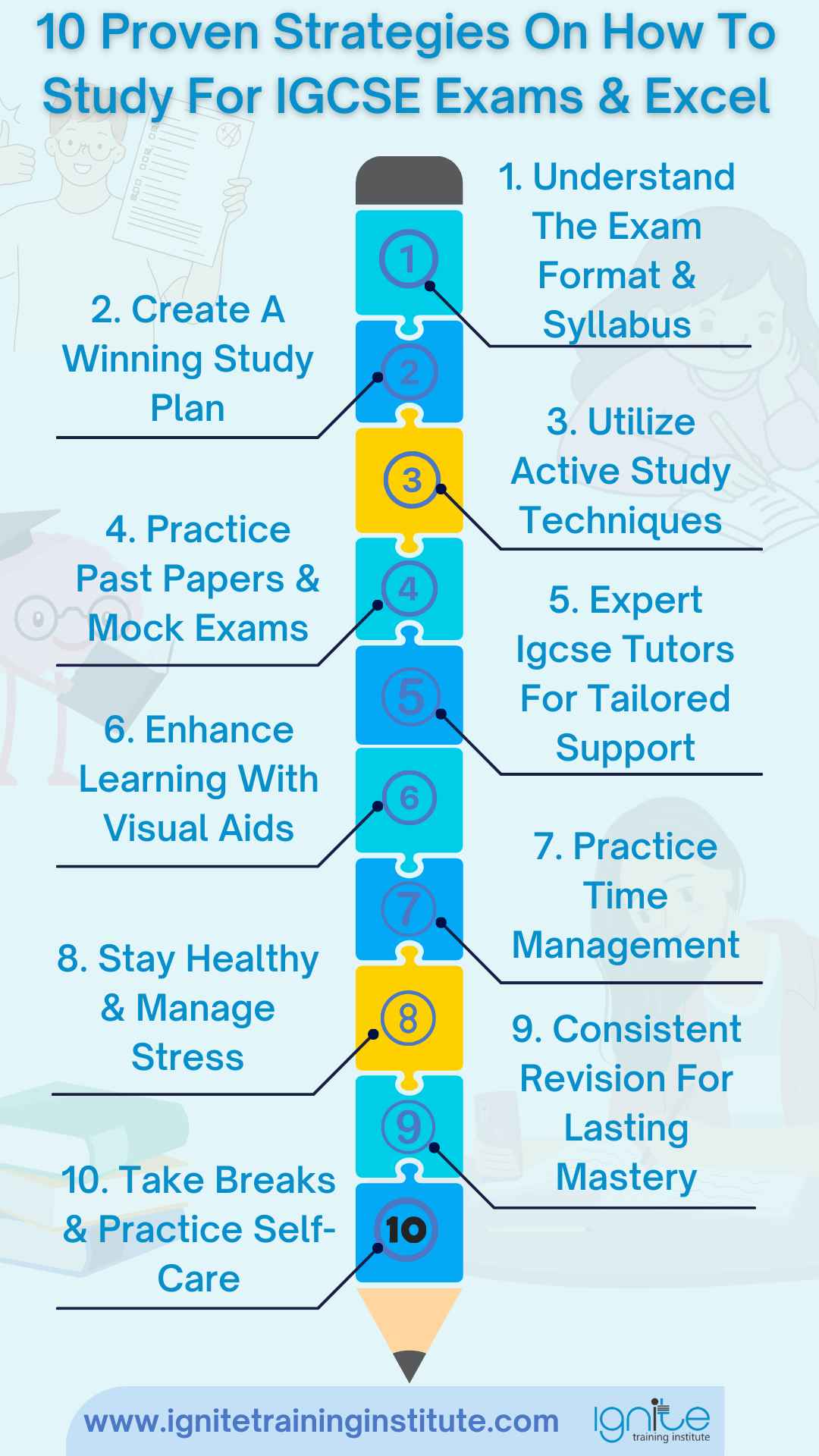Navigating IGCSE exams can be daunting, but you can turn challenges into triumphs with the right strategies. Discover ten proven techniques to streamline your study routine, enhance your understanding, and maximize your exam performance.
From mastering time management to employing active study methods, these strategies are designed to help you excel and confidently achieve your academic goals. Dive in to unlock the secrets of successful IGCSE preparation!
Moreover, Ignite Training Institute offers comprehensive tutoring support for IGCSE exams in UAE. Claim your free consultation session today.
Overview Of The IGCSE Exams
The International General Certificate of Secondary Education (IGCSE) is an internationally recognized qualification for students typically between the ages of 14 and 16. It is offered by Cambridge Assessment International Education and is widely recognized by schools, colleges, and universities around the world. The IGCSE exams are designed to assess students’ knowledge, understanding, and skills in various subjects.
The IGCSE curriculum offers a broad range of subjects, including core subjects such as English, mathematics, and sciences, as well as elective subjects like business studies, history, and foreign languages. The exams are structured to test students’ theoretical knowledge, practical skills, problem-solving abilities, and critical thinking skills. They are typically taken at the end of a two-year course of study, and the results are graded on an A* to G scale, with A* being the highest achievement.
IGCSE exams are known for their rigorous standards and comprehensive assessment criteria. They not only provide students with a solid foundation in the subject areas but also help develop important skills that are essential for further education and future careers. The IGCSE qualification is highly valued by educational institutions worldwide, making it a valuable credential for students seeking to pursue higher education or enter the workforce.
Related: IB VS IGCSE: The Exact Differences Between The Programs
10 Tips On How To Study For IGCSE Board Exams
The IGCSE board exams are a major step in a student’s academic journey, testing not just subject knowledge but also application skills and exam technique. To perform well, students need a smart study strategy that is consistent, structured, and suited to the demands of the syllabus.
Below are ten in-depth and practical tips that can help IGCSE students study more effectively, reduce exam stress, and approach their exams with confidence.

1. Understand The Exam Format & Syllabus
Start your preparation by thoroughly reviewing the official syllabus for each subject. The syllabus clearly outlines what topics will be assessed, how much depth is required, and which objectives (knowledge, understanding, application, analysis) are emphasized.
Get familiar with the structure of each exam paper, the types of questions (multiple choice, short answer, structured, extended response), the number of papers for each subject, and how marks are allocated.
This will help you know what to expect and reduce anxiety. Print the syllabus and use it as a checklist to track your revision progress over time.
2. Create A Winning Study Plan
A well-organized study schedule is key to covering the syllabus without feeling overwhelmed. Divide your revision time across subjects based on your strengths and weaknesses, and prioritize subjects that carry more weight or that you find difficult.
Avoid last-minute cramming by setting weekly and monthly goals and sticking to a consistent routine. Make sure your study plan is practical, factor in time for schoolwork, breaks, sleep, and personal commitments.
Using time management methods like the Pomodoro Technique (25 minutes focused study + 5-minute break) or time-blocking can help you stay productive. Review your plan weekly and adjust it if needed to keep up with your progress.
3. Utilize Active Study Techniques
Rather than passively reading textbooks, engage with the material through active recall and application-based methods. This includes summarizing concepts in your own words, writing flashcards, teaching a topic to someone else, or creating questions and then solving them.
These techniques deepen understanding and improve memory retention. Mnemonic devices, acronyms, and storytelling can help with memorizing definitions, processes, or sequences (e.g., the characteristics of living organisms or steps in mitosis).
Interactive learning, such as using apps for flashcard drills or joining study groups, also keeps the study process dynamic and less monotonous.
4. Practice Past Papers & Mock Exams
Doing past papers is one of the most effective ways to prepare for the IGCSE. It helps you understand question phrasing, identify recurring topics, and get used to time constraints.
Start with topical past paper questions to master each chapter, then move on to full papers under timed conditions to simulate the real exam. After each paper, mark your answers using the official mark scheme and read examiner reports to see where common mistakes happen.
Look out for repeated question trends and get familiar with how answers are structured. Set weekly targets for practice and track your progress to identify areas for improvement.
5. Expert IGCSE Tutors For Tailored Support
Sometimes, self-study isn’t enough, especially for subjects that require deeper conceptual clarity or structured problem-solving. IGCSE-qualified tutors provide personalized instruction, explain difficult concepts in simple terms, and guide you through exam techniques that are tailored to the IGCSE curriculum.
Tutors can also help you develop revision strategies, give you feedback on past paper attempts, and provide accountability.
Consider group tutoring if you benefit from peer interaction, or one-on-one sessions if you need focused attention. Whether it’s for core subjects or final exam preparation, professional support can make a big difference in results.
6. Enhance Learning With Visual Aids
Visual aids make learning more memorable and efficient, especially for subjects involving processes, cycles, or systems. Create mind maps to connect subtopics, flowcharts to illustrate sequences, and labeled diagrams to revise structures like the human heart, the water cycle, or the electromagnetic spectrum.
When you use visual tools consistently, they become powerful memory triggers during revision and exams.
You can also stick diagrams or summary posters on your wall or use digital tools to create color-coded concept maps. Reproducing these visuals from memory is a great way to test how well you’ve understood and retained the content.
7. Practice Time Management
Time management is critical for both preparation and exam performance. Start by analyzing how you spend your time each day, then create a timetable that balances all responsibilities while maximizing productivity.
Prioritize high-impact tasks like revision, practice, and note-making over passive reading.
In exams, allocate your time based on marks; a 6-mark question deserves more time than a 2-mark one. Use mock exams to practice finishing papers within the time limit and learn how to move on from difficult questions without wasting time.
8. Stay Healthy & Manage Stress
A healthy body supports a healthy brain, so don’t ignore your physical and emotional well-being. Get at least 7–8 hours of sleep each night to enhance concentration and memory. Eat balanced meals with brain foods like nuts, yogurt, and whole grains, and stay hydrated throughout the day.
Build physical activity into your routine, whether it’s a daily walk, yoga, or sports. It helps manage stress and boosts energy levels.
Avoid caffeine or sugary snacks before study sessions and exams, as they can lead to energy crashes. Use relaxation techniques like deep breathing or short meditation breaks when stress builds up.
9. Consistent Revision For Lasting Mastery
Don’t leave revision for the final weeks; spaced repetition is the best way to keep information in your long-term memory. This means reviewing topics repeatedly over increasing intervals (e.g., 1 day, 3 days, 7 days) to strengthen recall.
Create a revision timetable with color-coded topics and set fixed review days for each.
Use short quizzes, self-tests, or even explain-out-loud methods to check your memory. Active recall combined with spaced revision significantly boosts retention compared to rereading notes. Include a mix of subjects in your daily review to stay mentally fresh and avoid study fatigue.
10. Take Breaks & Practice Self-Care
Effective studying isn’t about how long you study, but how well you balance it. Taking breaks every hour helps your brain absorb and process information. Use this time to stretch, take a walk, do a hobby, or just relax. This resets your focus and helps prevent burnout.
Build self-care into your routine, especially during intense revision weeks. Listen to calming music, talk to friends, or write in a journal to keep emotions in check.
Remember, your overall well-being directly affects your ability to study and perform, so treat it as part of your exam strategy, not an afterthought.
Related: Cambridge IGCSE: Comprehensive Guide For Parents & Students
How To Stay Motivated During IGCSE Prep?
Staying motivated throughout the IGCSE journey can be challenging due to the demanding workload and long preparation time. However, with the right mindset and strategies, students can maintain focus and enthusiasm until the exams.
1. Set Clear And Achievable Goals
Break down your long-term goals into smaller, daily or weekly objectives. Whether it’s finishing a chapter, scoring better on a mock test, or revising a tough topic, short-term wins keep you moving forward. Celebrating these mini-milestones builds a sense of progress and boosts confidence.
2. Create A Reward System
Motivation improves when you associate study time with small, positive outcomes. After completing a set goal, reward yourself with something you enjoy – a snack, a short break, or a favorite show. This builds positive reinforcement and keeps the process enjoyable.
3. Stay Connected With Your Purpose
Remind yourself why you’re studying, whether it’s for future academic plans, a specific career, or personal growth. Keep a vision board or list of goals visible in your study space. Reconnecting with your “why” helps when motivation dips.
4. Boost Focus With Different Methods
Change your routine by using different study methods like flashcards, mind maps, podcasts, or group study sessions. A dynamic study approach prevents boredom and keeps your brain engaged. Gamifying your revision using quizzes or timers can also make studying more enjoyable.
5. Track Progress Visually
Use charts, checklists, or apps to monitor your syllabus coverage and performance in mock exams. Seeing how far you’ve come can be a powerful motivator. Visual progress makes goals feel more achievable and gives a constant sense of movement.
6. Surround Yourself With Positivity
Stay in touch with classmates, friends, or study groups who are also preparing for the IGCSE. Sharing progress and encouraging each other reduces isolation and boosts morale. You can also follow motivational content or success stories online to stay inspired.
7. Visualize Your Success Daily
Spend a few minutes each day imagining yourself achieving your goals — whether it’s getting top grades, receiving your results, or joining your dream university. Visualization builds positive momentum, reinforces your belief in success, and helps you stay mentally aligned with your efforts.
8. Take Care Of Your Well-Being
Motivation fades quickly if you’re physically or mentally exhausted. Maintain healthy habits like regular sleep, a balanced diet, physical activity, and time for hobbies. When needed, talk to someone: a mentor, tutor, or counselor, to stay mentally strong and focused.
Related: IGCSE Exams 2025: All You Need To Know To Get Started
How Many Hours In A Day Should You Study For IGCSE?
Determining the ideal number of hours to study each day for IGCSE exams can vary depending on individual needs and academic goals. Generally, it is recommended that students dedicate around 2 to 3 hours of focused study per day. This allows for a balanced approach, combining regular revision with breaks to maintain productivity and avoid burnout.
In the months leading up to the exams, students might need to increase their study time to 4 to 5 hours per day, incorporating past papers, mock exams, and targeted revision sessions. Students must create a study schedule that accommodates their strengths and weaknesses, while also factoring in adequate rest.
Related: IGCSE Grades Explained & Busting 5 Common Misconceptions
Get Expert IGCSE Tutor Support With Ignite Training Institute
Ignite Training Institute offers specialized IGCSE tutoring designed to meet the academic needs of students aiming for top grades. The tutoring programs are structured to provide subject-specific support, covering core and extended topics, exam strategies, and syllabus guidance.
Students benefit from small group sessions or one-on-one classes that allow for personalized attention and flexible learning. Each session at Ignite Training Institute is led by qualified and experienced tutors who focus on simplifying complex topics, clarifying misconceptions, and strengthening exam techniques.
The institute also provides regular progress tracking, mock exams, and customized revision plans to ensure students are consistently improving. This targeted approach helps students build confidence and stay on track throughout their IGCSE preparation.
Related: Best Tutors In Dubai For IB, IGCSE, A-Levels, & AP
FAQs
1. How Can You Achieve An A* In IGCSE Maths?
To achieve an A* in IGCSE Maths, it’s essential to have a strong grasp of the concepts, practice extensively with past papers, and hone your problem-solving skills. Additionally, managing your time effectively during the exam and presenting your solutions clearly can greatly contribute to securing the highest grade.
2. How To Effectively Study For IGCSE?
To effectively study for the IGCSE, create a structured study plan that covers all subjects and stick to a consistent revision schedule. Use a variety of resources, including past papers and practice questions, to reinforce understanding and track progress.
3. How Many Hours To Study For IGCSE?
The recommended study time for IGCSE exams typically ranges from 150 to 200 hours per subject, depending on individual proficiency and exam complexity. Consistent, focused study and revision throughout the year can help ensure thorough preparation.
4. How Do You Get An A* In IGCSE?
To achieve an A* in IGCSE, focus on understanding the core concepts deeply, excel in coursework and exams, and consistently practice past papers. Effective time management and seeking feedback from teachers can also enhance performance.
5 . How Do You Prepare For The IGCSE Exam?
Create a study schedule, understand the syllabus, and use past papers to practice. Focus on weak areas and revise regularly.
6. How Many Months Does It Take To Prepare For IGCSE?
Most students start preparing 6 to 9 months before the exam. The exact time depends on your subject load and current level.
7. How To Revise For IGCSE Exams?
Revise by summarizing notes, using flashcards, and practicing past papers. Break topics into chunks and review them consistently.
8. What Is The 2 3 5 7 Rule?
It’s a time management strategy: spend 2, 3, 5, and 7 minutes reviewing the same topic at increasing intervals to boost memory retention.
9. What Is The Best Way To Revise For IGCSEs?
Use active recall and spaced repetition for effective revision. Make summary notes, test yourself with flashcards and past papers, and review mistakes to strengthen weak areas. Spread revision over time with a clear study plan.
Takeaway

Preparing for IGCSE exams requires dedication, perseverance, and a strategic approach to studying. Throughout this guide, we have explored various tips and techniques that can greatly enhance your study routine and help you excel in your IGCSE exams.
Remember to understand the exam format, create a well-structured study plan, utilize active study techniques, practice past papers, seek clarification when needed, and prioritize self-care and stress management. By implementing these strategies, you can optimize your study time, deepen your understanding of the subjects, and improve your overall performance in the exams.
It is important to remember that success in IGCSE exams is not solely determined by the grades obtained, but also by the personal growth, knowledge acquisition, and skills developed throughout the journey. Embrace the learning process, stay motivated, and maintain a positive mindset as you navigate the challenges and triumphs of studying for IGCSE exams.
Related: IGCSE VS GCSE: Key Differences & Which Offers More?


